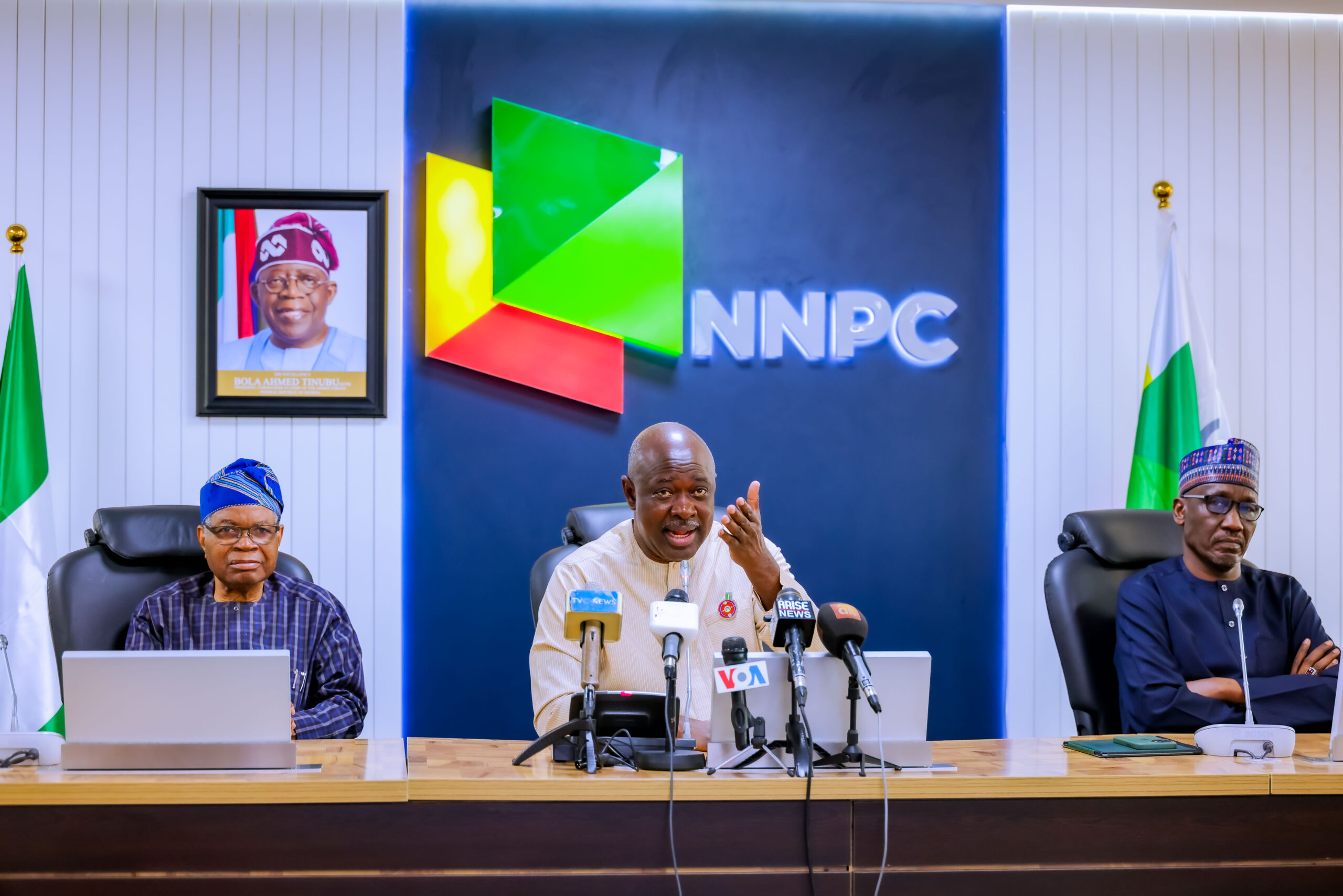Oil
Why Dangote’s PMS Prices Can’t Be Reduced In Nigeria – Adeoye

It is no longer news that Nigeria reached a major milestone with the launch of the Dangote Refinery, allowing the country to produce its own petrol instead of importing it.
Consequently, Nigerians expected fuel prices to drop, which would help lower the rising costs of goods caused by the high price of petrol, but that has not been the case.
Recall that the first batch of PMS from the Dangote Refinery hit the market on Sunday as promised by the federal government.
However the smiles on Nigerians faces quickly wore off and their hope on the refinery for a reduced fuel price after recent increment of pump price was dashed with the price sold to the Nigerian National Petroleum Company Limited (NNPC Ltd).
Many Nigerians who had anticipated a lesser price compared to the present market price of between N855 and N950 were jolted when the NNPC Ltd released a price template for the stock received from the refinery.
READ MORE: Cab Driver Threatens Legal Action After Adunni Ade Accuses Him of Package Theft
By implication, the price of Dangote PMS is over N100 costlier than the existing market price from NNPC retail stations and other major stations which has caused more fumes and complains by Nigerians.
Shedding light over the issues surrounding petrol price, an energy policy analyst, Yemi Adeoye while speaking on Friday at TVC Business News explained why PMS cannot be sold at lesser price by Dangote.
Adeoye explained that the NNPC is not the regulator of PMS if not an official announcement should have been made instead of Dangote’s instead NNPC is operating as a joint venture with Dangote like it is with every other international oil operating companies in Nigeria, which has come down to the relationship between Dangote Refinery and the NNPC. NNPC supplies Dangute crude oil, while the latter come back with refined PMS.
He also noted that the average price for gas everywhere in the world as well as U.S. is $3.33 in gallons, which amounts to N5,279 in Naira. He explained that a gallon is 4 liters and breaking it down per liter is N1,019.75, which Dangote would have been selling their PMS if allowed to function as a business entity. Therefore, the normal price should have been nothing less than N1,300 per liter without the regulation.
Explaining further, Adeoye said, “Nigeria produces crude oil but refining it requires several steps. First, crude oil must be extracted, which necessitates the use of an oil rig. The cheapest oil rig available costs around $100,000 to $150,000 per day. These factors, among others, contribute to the pricing of Premium Motor Spirit (PMS) because it is an international commodity.” while noting that Dangote would not have announced the price without the regulation of the NNPC.
Adeoye said the commitment of NNPC towards this is supplying crude oil to Dangote in naira instead of dollars which is fair.
“If Dangote should sell PMS as it should, it will be nothing less than N1300. The united state is the highest producer of crude oil with 32 refinaries and sells at N1,319 per liter talkless of Nigeria who owns just one refinary, he added.
Finally, Adeoye said PMS hike is a global phenomenal and it is affecting everything.
Oil
NNPC Targets 60% Methane Emission Reduction By 2031
The Nigerian National Petroleum Company Limited (NNPC) has unveiled a bold strategy to reduce methane emissions in the oil and gas sector by 60% by 2031, with an ultimate goal of achieving net-zero emissions by 2060.
This announcement reinforces Nigeria’s leadership role under the Global Methane Pledge initiative and its commitment to tackling climate change.
The Group Chief Executive Officer of NNPC, Mele Kyari, disclosed these plans during a meeting on Thursday with Robert Leahman, the U.S. State Department’s Global Methane Program Manager, and a delegation from Deloitte.
READ MORE: Atiku Gloats Over AUN’s Achievements Ahead Of 20th Anniversary
The discussions, held at the NNPC Towers in Abuja, focused on collaborative efforts to reduce methane emissions through innovative and sustainable practices.
“Reducing methane emissions is not just an environmental necessity but also a strategic imperative for Nigeria’s energy transition. We are leveraging partnerships to adopt global best practices and innovative solutions,” Kyari stated.
Key among these efforts is a pilot project in the Niger Delta, aimed at establishing emissions baselines, mitigating methane leaks, and promoting sustainable operations across Nigeria’s energy sector.
The project, a partnership between NNPC, Deloitte, and the U.S. Bureau of Energy Resources, will utilize data-driven methodologies to pinpoint and address methane hotspots.
Robert Leahman commended Nigeria’s proactive stance, describing it as a benchmark for other nations on the continent.
“Nigeria’s leadership under the Global Methane Pledge sets a standard for the continent. These initiatives will not only help reduce emissions but also drive sustainable development in the energy sector,” he said.
Kyari highlighted the broader benefits of addressing methane emissions, noting its significance for both environmental protection and economic efficiency.
“This collaboration is a game-changer. By addressing methane leaks, we’re reducing waste, saving costs, and protecting the environment. It’s a win-win for our economy and the planet,” he added.
Oil
FG Introduces New Incentives To Revitalize Nigeria’s Oil & Gas Industry
In a strategic move to revitalize Nigeria’s oil and gas sector, the Federal Government has unveiled two key fiscal incentives aimed at attracting investment and enhancing energy security.
The announcement was made by Mr. Wale Edun, the Minister of Finance and Coordinating Minister of the Economy on Wednesday.
The first initiative, the Value Added Tax (VAT) Modification Order 2024, introduces critical exemptions for essential energy products and infrastructure, including Diesel, Feed Gas, Liquefied Petroleum Gas (LPG), Compressed Natural Gas (CNG), Electric Vehicles, Liquefied Natural Gas (LNG) infrastructure, and Clean Cooking Equipment.
Read Also: Atiku Calls For Rotational Presidency Across Nigeria’s Geopolitical Zones
These exemptions are designed to reduce living costs for Nigerians, promote energy security, and accelerate the transition to cleaner energy alternatives.
The second initiative, the Notice of Tax Incentives for Deep Offshore Oil & Gas Production, offers new tax relief options for deep offshore exploration projects.
This measure aims to position Nigeria’s deep offshore basin as a premier destination for international oil and gas investments, boosting the country’s appeal to foreign investors.
These reforms are part of a broader set of policy initiatives, known as Policy Directives 40-42, endorsed by President Bola Ahmed Tinubu.
The directives reflect the administration’s commitment to fostering sustainable development in the energy sector and enhancing Nigeria’s competitive edge in the global oil and gas market.
Business
Tinubu set to approve ExxonMobil-Seplat oil deal, expands CNG bus initiative

By Yemie Adeoye
NIGERIA’s President Bola Tinubu has announced that the protracted ExxonMobil-Seplat upstream oil divestment will be formally approved by the Minister of petroleum within a matter of days, just as he announced his government’s intention to expand the Compress natural Gas, CNG buses initiative.
The President who stated this during his Independence day nationwide broadcast stated that the move is in line with his administration’s commitment to free enterprise, free entry and free exit in investments which is the hallmark of his administration investment policy.
“Fellow compatriots, our administration is committed to free enterprise, free entry, and free exit in investments while maintaining the sanctity and efficacy of our regulatory processes. This principle guides the divestment transactions in our upstream petroleum sector, where we are committed to changing the fortune positively. As such, the ExxonMobil Seplat divestment will receive ministerial approval in a matter of days, having been concluded by the regulator, NUPRC, in line with the Petroleum Industry Act, PIA. This was done in the same manner as other qualified divestments approved in the sector.”
The President also seized the opportunity to plead with Nigerians to be patient with his administration’s reform policies. “As your President, I assure you that we are committed to finding sustainable solutions to alleviate the suffering of our citizens. Once again, I plead for your patience as the reforms we are implementing show positive signs, and we are beginning to see light at the end of the tunnel”.
“Our energy transition programme is on course. We are expanding the adoption of the Presidential Initiative on Compressed Natural Gas for mass transit with private sector players. The Federal Government is ready to assist the thirty-six States and FCT in acquiring CNG buses for cheaper public transportation.
Fellow Nigerians, while we are working to stabilise the economy and secure the country, we also seek to foster national unity and build social harmony and cohesion. Our economy can only thrive when there is peace”. he enthused.


















